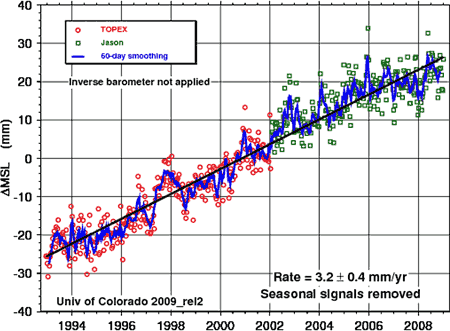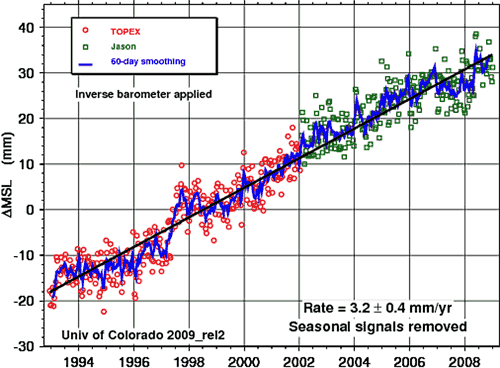Are sea levels rising?
Posted on 30 April 2009 by John Cook
A common error in climate debate is drawing conclusions from narrow pieces of data while neglecting the whole picture. A good example is the recent claim that sea level rise is slowing. The data cited is satellite altimeter measurements of global mean sea level over the past 16 years (Figure 1). The 60 day smoothed average (blue line) seems to indicate sea level peaked around the start of 2006. So one might argue that sea levels haven't risen for 3 years. Could one conclude that the long term trend in sea level rise has ended?

Figure 1: Satellite altimeter measurements of the change global mean sea level with inverse barometer effect (University of Colorado).
To answer this question, all one has to do is view the entire 16 year dataset. A noisy signal is imposed over the long term trend of sea level rise. These fluctuations mean there will be short periods where sea level shows no trend. For example, 1993 to 1996 or 1998 to 2000. In other words, there have been several short periods of several years over the last 16 years of steady sea level rise where sea level appears not to rise.
This is inevitably the case when you have a noisy signal imposed over a long term trend. We see exactly the same phenomenon occur in the temperature record (which is why we also see the same erroneous conclusions). The lesson from this is to treat with skepticism anyone who concludes long term trends from several years of a noisy signal (after all, skepticism should cut both ways).
In addition to this, Figure 1 is a particularly noisy signal because it displays unfiltered data. Sea level is subject to the "Inverse Barometer" Effect. This is where sea level is depressed in areas of high atmospheric pressure, and raised in areas of low pressure. When barometric pressure effects are filtered out, the result is a less noisy signal and a clearer picture of what's happening with sea level.

Figure 2: Satellite altimeter measurements of the change global mean sea level with inverse barometer effect filtered out (University of Colorado).































 Arguments
Arguments






























As for your last comment, thoroughly read all the positives versus the negatives of global warming and tell me you're still hoping for warming.